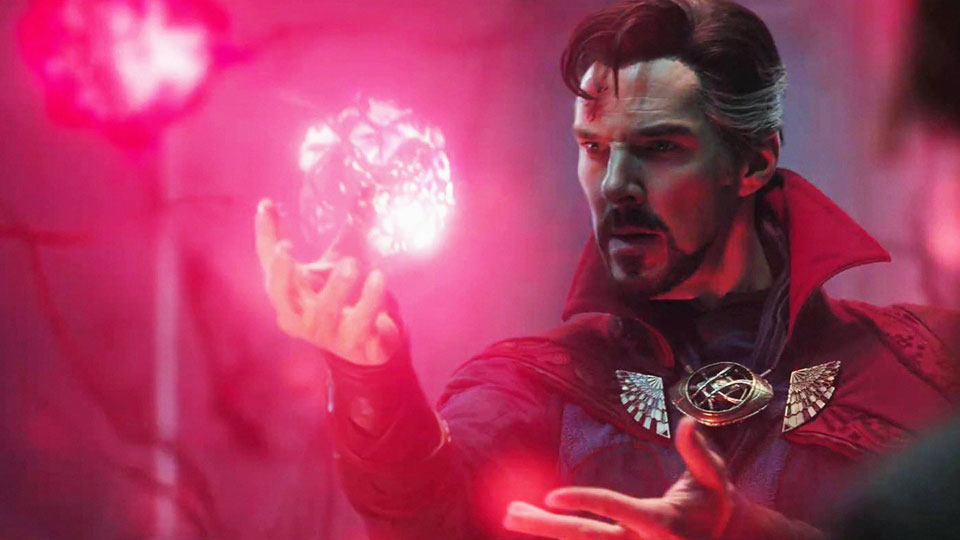
Doctor Strange in the Multiverse of Madness could very easily have proven to be a misstep in an increasingly predictable slate of Marvel films. The Marvel Cinematic Universe (MCU) has proven itself an interesting pop culture experiment, yet it runs the risk of becoming too formulaic, as well as alienating casual viewers with its increasingly complex – and sometimes convoluted – mythology. This Sam Raimi-directed film, however, served as one of the strongest entries so far in the overall canon, while working just as well as a standalone popcorn flick. It’s a delicate balance to strike, but it does so with finesse.
Benedict Cumberbatch returns to the titular role, one that he previously reprised in last year’s Spider-Man: No Way Home. Unlike that film, Multiverse of Madness dispenses with flimsy, byzantine storytelling and glaring plot holes, trading them for a straightforward three-act structure that dodges typical MCU clichés and – for the first time in this cinematic universe – delivers on genuine horror. This feels very much like a real Sam Raimi film, rather than yet another film that feels like it was slapped haphazardly together on the corporate Marvel/Disney assembly line. For those who have not yet seen the film, note that there are major spoilers in the paragraphs that follow.
When newcomer America Chavez (Xochitl Gomez) arrives in Doctor Strange’s universe, pursued by a monster of clearly Lovecraftian inspiration, Strange learns that she’s been hopping from one universe to another, pursued by demons who want her multiverse-traversing ability. Recognizing marks of witchcraft on the monster, Strange consults with Wanda Maximoff/Scarlet Witch, played excellently once again by Elizabeth Olsen, who really took ownership of the character with a stellar performance in WandaVision. Strange realizes Wanda is behind the attacks, as she hopes to absorb Chavez’s power and use it to travel to another universe where she can reunite with her children.
It’s the least complicated film plot Marvel has done in a long time, and it serves as a perfunctory launching pad to get into the thick of what the film has long teased – certainly in its title, if not in its trailers. A pursuit by an unbalanced, vengeful Scarlet Witch across multiple universes follows, as Strange tries to lead Chavez to safety while searching for the Book of Vishanti, a sorceror’s grimoire that could give him power enough to destroy Wanda’s own book of magic, the Darkhold, which would effectively depower her.
The universes explored are surprisingly creative, not only in the visual sense, but culturally and philosophically. One version of New York City depicts an egalitarian society, where care for the environment is held in high regard, with vertical forest skyscrapers and rooftop gardens empowering nature and climate. It’s also a place where intellect and education are prized, represented by a group of powerful geniuses called the Illuminati. Here not only does John Krasinski appear as Mr. Fantastic (a bit of fan casting that has finally come to fruition), but this film sees the return of Patrick Stewart to his role as Professor Charles Xavier from the X-Men films.
Certainly, a six-person “elite” conjures disconcerting parallels to the real-world One Percent, but we don’t get enough time with the group to learn more about them – one of the few missed opportunities of the film – so we don’t know if their exclusivity is defined so much by financial status as it is by intellect capability. Regardless, Stewart gives an unsurprisingly great performance in the short window of time he’s given, but his unceremonious death to advance the plot undercuts his appearance in the film.
One of the biggest drawbacks to Multiverse of Madness, unfortunately, is in how it treats its women. Both Wanda and Chavez are defined more by their status as victims than they are by their character traits and positive attributes. In the film’s third act Chavez herself mostly spends the time filling the tired and traditional damsel in distress role, and her brief moment of taking control after this is not enough to redeem this narrative mistake. Wanda’s character is more complicated, as depicting her as a grieving mother willing to do anything for her children is a powerful idea that allows the viewer to empathize with her, yet it also lets the writers portray her as unhinged and hysterical – perceived traits that have long been used by men to discriminate against and belittle women. Moreover, while her horrific and menacing depiction as an antagonist is appropriately creepy, it undercuts the nuance that Olsen brought to the role so effectively in WandaVision.
Male characters, meanwhile, once again hog the spotlight, though Benedict Wong puts in a great performance as Sorcerer Supreme Wong, benefitting from his extra screen time, while Cumberbatch knocks it out of the park in his role as Strange as easily and naturally as ever. Other female characters are given just enough to do to serve the plot, and little more, with both Rachel McAdams’ Christine Palmer and Lashana Lynch’s version of Captain Marvel being done a disservice because of this. Hayley Atwell gets a few moments to shine as Illuminati member Captain Carter, yet even her character proves little more than cannon fodder for Wanda’s killing spree.
Regarding said spree: Multiverse of Madness is easily the most violent and blood-soaked MCU film yet, and while that’s certain to garner its detractors, it works phenomenally for Raimi’s horror-oriented direction. With elements that serve as clever and subtle callbacks to the Evil Dead films (and a cameo by Bruce Campbell!), and scenes that never shy away from depicting zombies, dark spirits, and demons in all their gory glory, the film mixes 80s-throwback horror with trippy cinematography and just enough of an undercurrent of unabashed campiness to feel like the most wonderfully un-MCU-like film in Marvel’s filmography thus far.
It quickly became my personal favorite out of all the Marvel films, and rather than feeling like yet another cog in the company’s well-oiled machine, it readily embraces the giddy phantasmagoria of its own story and visuals, dispensing with the Disney-approved one-liner humor and exhausting CGI-laden, city-destroying battles that have exhaustingly become the usual for films of this kind. Though it fails its women and thus serves as an important lesson on how Marvel needs to course-correct on this issue, its qualities as a relentlessly dark, weird journey into cinematic fantasia make for one hell of a viewing experience.
If you can forgive its few weak spots and heavy-handed faux pas, as well as suspend your disbelief and let yourself be invested in this fun, bizarre world, you won’t be disappointed.












Comments